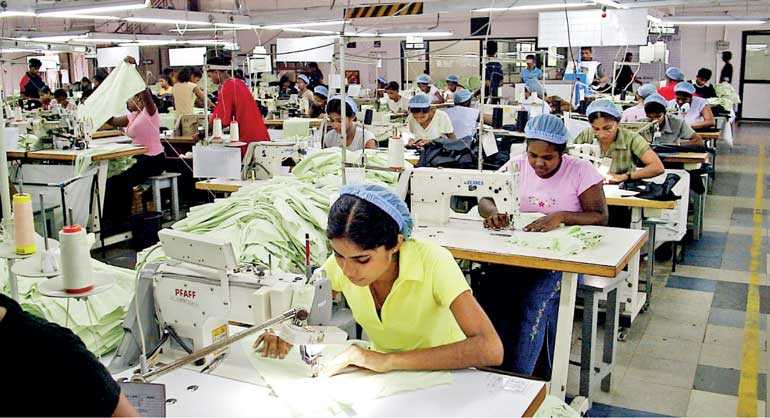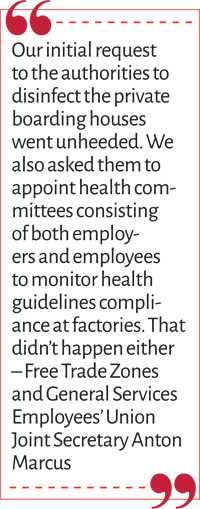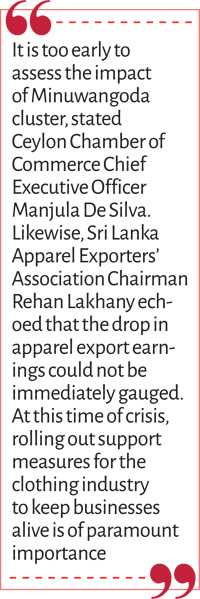Thursday Feb 19, 2026
Thursday Feb 19, 2026
Saturday, 14 November 2020 00:10 - - {{hitsCtrl.values.hits}}

Despite their massive contribution to the economy, stigmatisation of, and discrimination against, the FTZ women workers is rampant, as evidenced by the social media furore that followed the recent sudden COVID-19 outbreak
By Dishani Senaratne
A frontline female labour force in the country’s economy, Sri Lanka’s apparel factory workers are currently struggling against hostile social attitudes as the industry reels under the impact of the COVID-19 onslaught. The governmental authorities, factory owners and industry leaders are now poised to meet the worsened pandemic threat.
As Sri Lanka had initially curbed the spread of COVID-19 compared with most countries, the detection of a COVID-positive garment factory worker in Minuwangoda sent shock waves across the country. While confirmed positive cases are being recorded daily across the country, the health authorities have so far denied community transmission of this disease even though the contact source for this case is yet to be ascertained.
Unarguably, the recent unprecedented spike in COVID-19 cases has brought into focus a host of long-ignored socio-economic issues confronted by the Free Trade Zone (FTZ) workers that have exacerbated during the pandemic.
Contributing 6% to Sri Lanka’s Gross Domestic Product (GDP), the textile and apparel sector remains the largest export earner, having surpassed traditional exports of tea, rubber and coconut. The FTZ workforce is overwhelmingly made up of women from relatively rural areas who have migrated to cities for employment in the expanding manufacturing and services sectors.
Stigmatisation and discrimination
Despite their massive contribution to the economy, stigmatisation of, and discrimination against, the FTZ women workers is rampant, as evidenced by the social media furore that followed the recent sudden COVID-19 outbreak.
In contrast, the Navy personnel hit by the previous Welisara base outbreak, were commended for performing their duty to the country, Sumika Perera, heading the Women’s Resource Centre (WRC), Kurunegala, pointed out.
Likewise, in the previous months, when small COVID outbreaks occurred in neighbouring areas, comments on the cyberspace tried to blame the Muslim community for supposedly acting as “vectors” in spreading the virus.
Sadly, such episodes point to the fact that it is the vulnerable social groups such as women and ethnic minorities that are targeted by such hate speech during social crisis conditions. The persistence of such sexist and misogynist online messaging could pose a challenge to attracting and retaining women to the FTZ workforce in the long term.
With such online hostile messaging mounting after the Minuwangoda factory outbreak, the Joint Apparel Association Forum (JAAF) in a news media statement, appealed to the public to stand in solidarity with the FTZ employees, rather than solely blaming them for this latest coronavirus resurgence.
Living and working conditions of FTZ workforce
With public attention focusing on the epidemic numbers, there is little general awareness about the difficult living and working conditions of the FTZ workforce as they struggle to survive the pandemic even as they are compelled to meet tight factory deadlines. An indication of their work pressures is the challenge FTZ workers face to obtain their holiday leave entitlement.
“Most workers have to earn their 14 days of annual leave, after working at least 218 days in the previous year,” Anton Marcus, Joint Secretary of the Free Trade Zones and General Services Employees’ Union pointed out. “No separate Sick Leave is granted,” he lamented.
It is such bleak working conditions of FTZ employment that has possibly driven many women to take up blue-collar jobs in oil-rich West Asia, notwithstanding increasing reports of employee abuse and violence in that region.
With the Government’s directive to FTZ employers to update the personal data of their labour force, the problems encountered by FTZ workers who are hired by third party labour sub-contractors/agents have been put under the microscope. Most of such workers are on precarious daily wage schemes engaged in physically demanding jobs yet having little or no access to benefits enjoyed by their regular, permanently tenured counterparts. This includes a lack of any trade union representation. This practice of limited tenure labour outsourcing is common not only in the private sector but also in certain state sector institutions.
With the sudden closure of factories due to the latest epidemic outbreak, the FTZ workforce has been doubly ignored by their agents and employers. Proper regulation in the field of labour deployment is needed as all workers have a right to decent work, irrespective of the nature of the job. 
Shortage of affordable, decent accommodation
On the other hand, the proliferation of makeshift boarding places in close proximity to FTZs indicates the shortage of affordable, decent accommodation facilities. Adherence to health guidelines at overcrowded boarding houses which have shared sanitation facilities is an uphill task, with workers’ unions complaining.
“Our initial request to the authorities to disinfect the private boarding houses went unheeded. We also asked them to appoint health committees consisting of both employers and employees to monitor health guidelines compliance at factories. That didn’t happen either,” veteran union leader Marcus said, describing the Government approach to the coronavirus in recent months as “lackadaisical”.
Police Spokesperson DIG Ajith Rohana later acknowledged that the virus was spread from one factory to another by the workers coming from their densely shared housing.
Meanwhile, the Daa Bindu Collective, a non-profit FTZ workers’ service organisation, revealed that there have been numerous incidents in which military personnel on pandemic duty had barged into female workers’ boarding houses demanding the women to transfer to quarantine centres at short notice. The Daa Bindu staff said the workers had found the quarantine facilities to be in deplorable condition. Consequently, a writ petition was filed in the Appeal Court asking the Government to adhere to international quarantine regulations and protect the rights of workers.
Pandemic’s financial ripple effect
Conversely, a large number of boarding house owners in the vicinity of the Katunayaka FTZ were also doubtful about their financial ability to survive the coming months with their worker tenants now impoverished by the pandemic shutdowns.
“We were earlier asked by the Government to charge only half of the monthly rent from the tenants. Some of the workers were stuck here without any food. We are not inhuman. But, is the Government asking us to do the same again?” a landlord from Walana lamented. He urged the Government to intervene in the matter of the pandemic’s financial ripple effect on their sources of income.
The onset of the pandemic in March was a devastating blow to the economy that had barely begun to recover after the 2019 Easter bombings and the uncertainties of the 2018 constitutional crisis, Ceylon National Chamber of Industries (CNCI) Chairman Ruwan Edirisinghe noted. The implementation of a debt moratorium alongside the introduction of relief loan schemes particularly for the Micro, Small and Medium-scale Enterprises (MSMEs) initially gave some breathing space for entrepreneurs but the sudden emergence of the Minuwangoda cluster has hit them yet again, Edirisinghe further observed.
“There has been a drop in construction labourers reporting back to work in Colombo owing to the fear of contracting the virus. Most projects are on standstill,” he added, describing the immediate impact of the latest outbreak on the workflow in the construction industry.
Support measures of paramount importance
It is too early to assess the impact of Minuwangoda cluster, stated Ceylon Chamber of Commerce (CCC) Chief Executive Officer Manjula De Silva. Likewise, Sri Lanka Apparel Exporters’ Association Chairman Rehan Lakhany echoed that the drop in apparel export earnings could not be immediately gauged. At this time of crisis, rolling out support measures for the clothing industry to keep businesses alive is of paramount importance.
Amid the economic downturn, some FTZ workers were more worried about their growing job vulnerability, rather than their health. “I’m waiting to get back to work because I’m the only breadwinner in my family,” a worker from Matale who is under quarantine declared. Her sad plight illustrates how the majority of the FTZ workers have limited job options available, given their relatively low level of education.
Opportunity to build back better but fairer
Ideally, the sudden spike in COVID- 19 cases should be viewed by the textile and apparel sector, not merely Brandix, as an opportunity to build back better but fairer.
In a statement issued in mid-October, the Sri Lanka Chamber of Garment Exporters reiterated that confirmed COVID cases were not endemic to Brandix and a similar situation could occur at any time to any of their member companies. It was only a matter of time before garment workers in different plants as well as corporate sector employers were identified with COVID.
The Department of Labour says it has not received any evidence to indicate that the Brandix plant in Minuwangoda had violated labour laws, in spite of serious allegations made on social media. Nevertheless, Brandix has also launched its own probe to investigate into alleged violation of health and safety protocol.
“Last year Brandix brought fame to the country by becoming the world’s first manufacturing facility to achieve ‘Net Zero Carbon’ status that exemplified its commitment to environmental sustainability. We are confident that the investigation will come to fruition and necessary action will be taken accordingly,” Lakhany emphasised.
Arguably, appointing a single committee consisting of all the relevant stakeholders to look into this matter would have helped ensure transparency and inclusivity in the whole response to the Minuwangoda cluster.
The probe report findings must be made public and necessary action should be taken against those guilty sans making someone the scapegoat. Admittedly, the existing legal framework might not be sufficient to probe COVID-related accusations, as already acknowledged by the Department of Labour.
The much-awaited Gazette notification on COVID- 19 health guidelines is a step taken in the right direction to combat the pandemic though legislation alone is woefully inadequate to mitigate the spread of this physically and economically crippling disease.
Despite past initiatives that have enhanced the credibility of Sri Lankan clothing exports, the ‘Garments without Guilt’ campaign risks becoming a farce if worker rights are found to be violated and living conditions decline due to pandemic contingencies. The 2012 Dhaka garment factory fire provided an impetus for the global apparel sector to promote ethical fashion although at the cost of Bangladeshi lives.